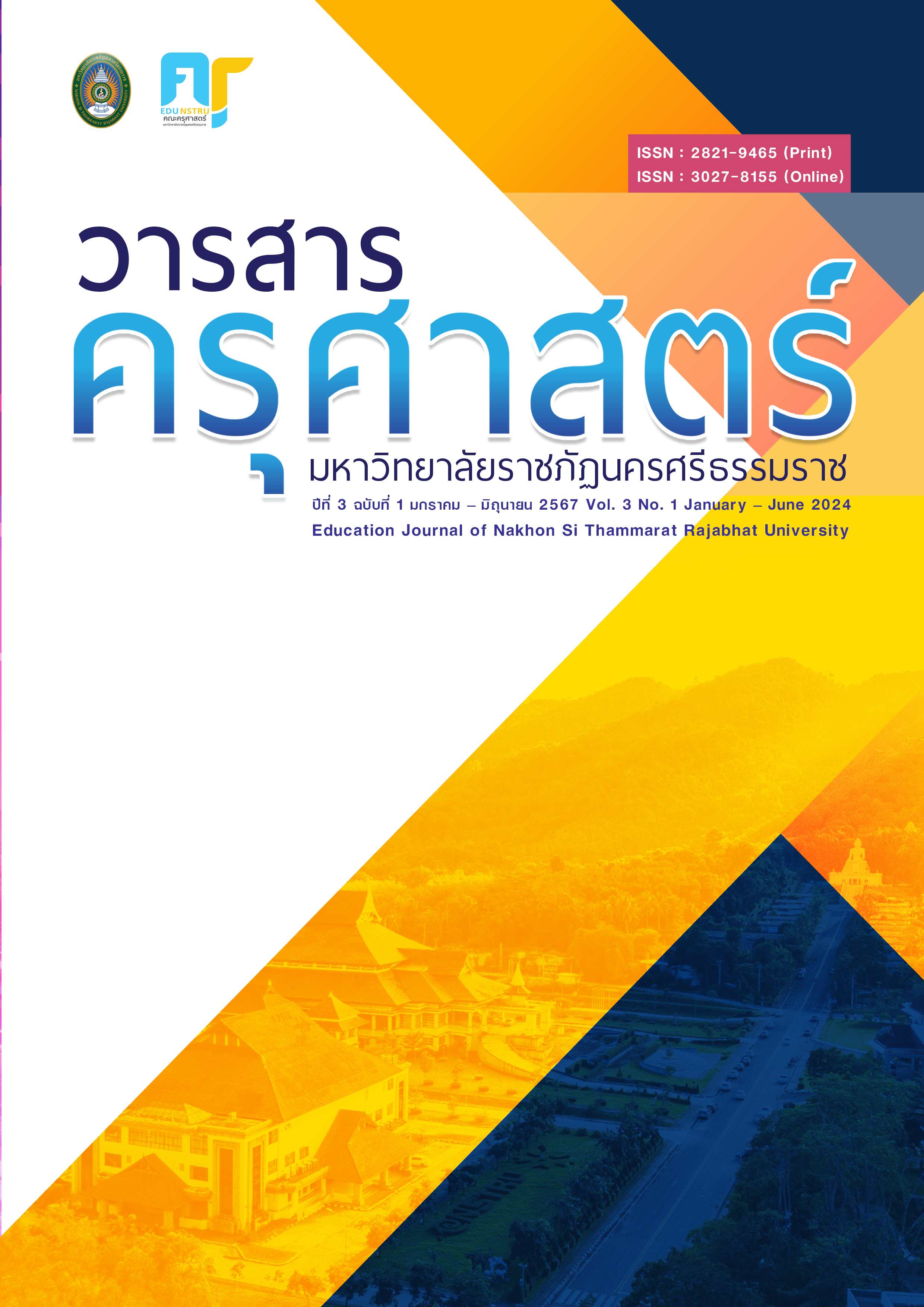The Development of Teachers Toward Professional Teaching in the Digital Age
Main Article Content
Abstract
In the digital age where technology plays a crucial role in learning, teachers need to develop new skills in order to deliver effective and modern teaching. Developing teachers to become professional instructional innovators will foster the development of digital skills, creative use of technology in the classroom, design of engaging and participatory learning activities, as well as the creation of flexible and learning-conducive environments. From this academic article, the objective is to present the process of developing teachers to become professional instructional innovators in the digital age, according to the ADDIE model under the K-R-U-P-R-O-5G framework (6 steps): 1. Knowledge 2. Reflection 3. Understanding 4. Practice 5. Improvement 6. Continuous development. This aims to build the characteristics of new generation teachers with the 5G model. Developing teachers to become professional instructional innovators in the digital era will help create outstanding, modern and more effective learning experiences, which will enable students to have the potential to compete in the digital world. Developing professional instructional innovator teachers is crucial for preparing students for the digital age.
Article Details

This work is licensed under a Creative Commons Attribution-NonCommercial-NoDerivatives 4.0 International License.
บทความที่ได้รับการตีพิมพ์เป็นลิขสิทธิ์ของวารสารครุศาตร์ มหาวิทยาลัยราชภัฏนครศรีธรราช
ข้อความที่ปรากฏในบทความแต่ละเรื่องในวารสารวิชาการเล่มนี้เป็นความคิดเห็นส่วนตัวของผู้เขียนแต่ละท่านไม่เกี่ยวข้องกับวารสารครุศาสตร์ มหาวิทยาลัยราชภัฏนครศรีธรรมราช
References
Ainley, J., Schulz, W., & Fraillon, J. (2016). A Global measure of digital and ICT literacy skills (Australian Council for Educational Research, Ed.). Australian: Australian Council for Educational Research. Retrieved from https://unesdoc.unesco.org/ark:/48223/pf0000245577
Borg, S. (2009). English language teachers' conceptions of research. Applied Linguistics, 30(3), 358-388. https://doi.org/10.1093/applin/amp007
Butrakhiao, C. (2018). Strategies for developing teachers with characteristics consistent with the 21st century, Buabundit Journal of Educational Administration, 18(2), 231-242. (in Thai)
Cambridge University Press. (2021). Innovator. Cambridge Dictionary. https://dictionary.cambridge.org/dictionary/english/innovator
Chanthanasi, N. (2016, October 4). GURU Professional Teacher. TruePlookpanya. https://www.trueplookpanya.com/education/content/50207/-edu-teaartedu-teaart-teaarttea-- (in Thai)
Chaiyacharoen, S., Kanjug, I., Samat, J., & Kwangmuang, P. (2018). Design and Development the Learner’s Knowledge Construction Learning Innovation based on Thai Wisdom and Thai Living on the topic of soil for fourth grade students. Humanity and Social Science Journal, Ubonratchathani University, 9(1), 134-157. Retrieved from https://so02.tci-thaijo.org/index.php/human_ubu/article/view/185837/131625 (in Thai)
Chitsamkit, W. (2011). Teachers. Bangkok: odeonstore. (in Thai)
Collins. (2021). Innovator. Collins dictionary. Retrieved from https://www.collinsdictionary.com/dictionary/english/innovator
Desimone, L. M. (2009). Improving impact studies of teachers' professional development: Toward better conceptualizations and measures. Educational Researcher, 38(3),
-199. https://doi.org/10.3102/0013189X08331140
Guskey, T. R. (2000). Evaluating professional development. Thousand Oaks, CA: Corwin Press.
Huling, L., & Resta, V. (2001). Teacher mentoring as professional development. ERIC Digest. ERIC Clearinghouse on Teaching and Teacher Education, Washington, DC. https://eric.ed.gov/?id=ED460125
Independent Commission for Education Reform. (2019). National education reform plan Independent Commission for Education Reform. Bangkok: Independent Commission for Education Reform. http://nscr.nesdc.go.th/wp-content/uploads/2022/03/แผนการปฏิรูปประเทศด้านการศึกษา.pdf (in Thai)
McGriff, Steven J. (2000). Instructional System Design (ISD): Using the ADDIE Model. Instructional Design Models. 226(14): 1-2. Retrieved from https://www.lib.purdue.edu/sites/default/files/directory/butler38/ADDIE.pdf
Prommaboon, T. (2018). Development of New Generation Teachers’ Characteristics Scale for Bachelor of Education 4th Year Student Surindra Rajabhat University; An Application of Differential Item Functioning. Journal of Educational Measurement Mahasarakham University, 24(1), 138-151. Retrieved from https://so02.tci-thaijo.org/index.php/jemmsu/article/view/146651 (in Thai)
Rakruangdet, W. (2021, December 17). Open educational innovation and technology to support the Next New Normal. Bangkok Thurakit. https://www.bangkokbiznews.com/social/977893 (in Thai)
Sinlarat, P. (2018). It is necessary to reinvent Thai education. Bangkok: Chulalongkorn University Press. (in Thai)
Stoll, L., Bolam, R., McMahon, A., Wallace, M., & Thomas, S. (2006). Professional learning communities: A review of the literature. Journal of educational change, 7(4), 221-258. https://doi.org/10.1007/s10833-006-0001-8
Sunthonnon, T. (2022). Components and indicators of professional teaching in the digital age of teachers under the office Promote non-formal and informal education. in the three southern border provinces (Doctoral dissertation). Songkhla: Hatyai University. (in Thai)
The United Nations Educational, Scientific and Cultural Organization. (2011). Unesco ict competency framework for teachers. France: United Nations Educational, Scientific and Cultural Organization. Retrieved from https://iite.unesco.org/pics/publications/en/files/3214694.pdf
Wiboolyasarin, W. (2015). A Web-Based Instructional Design Principle Based On Addie Model To Teach Fundamental Thai Conversation For Foreigners. Srinakharinwirot Research and Development Journal of Humanities and Social Sciences, 6(12), 192–205. Retrieved from https://so04.tci-thaijo.org/index.php/swurd/article/view/32192.
(in Thai)
Yuyuen, P., Phumiota, A., & Sriyothin, S. (2017). Wongthanavasu (Ed.), Public Affairs Management Under Thailand 4.0. The 4th National Conference on Public Affairs Management (pp. 827-833). Khon Kaen University. https://conference.kku.ac.th/colaimg/files/articles/b9e07-o-76-.pdf (in Thai)


